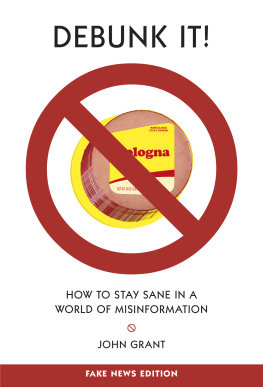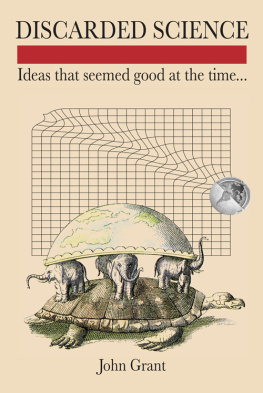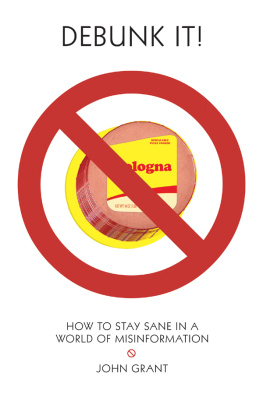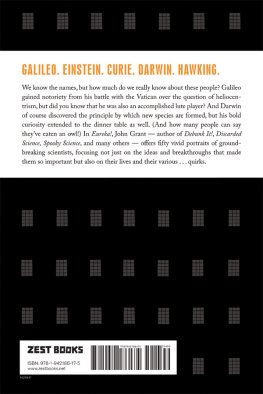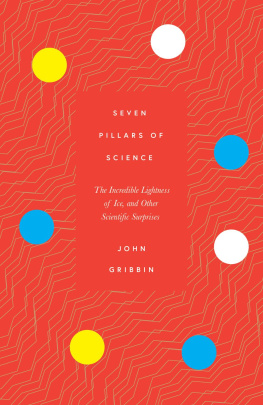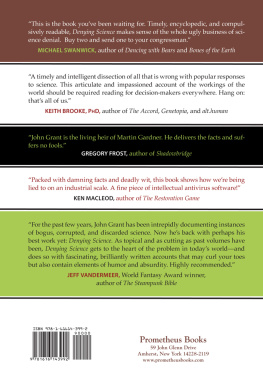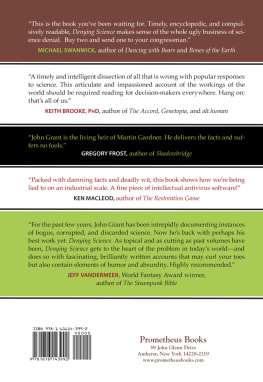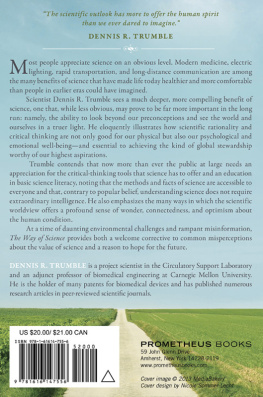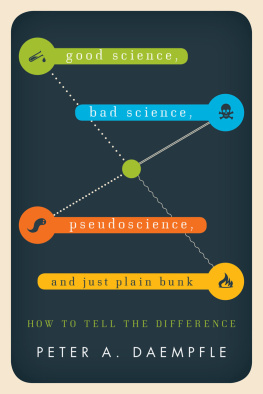B OGUS S CIENCE

J OHN G RANT

B OGUS S CIENCE
Published by Facts, Figures & Fun, an imprint of AAPPL Artists and Photographers Press Ltd.
Church Farm House, Wisley, Surrey GU23 6QL
Sales and Distribution
UK and export: Turnaround Publisher Services Ltd.
USA and Canada: Sterling Publishing Inc.
Australia & New Zealand: Peribo Pty.
South Africa: Trinity Books.
Copyright AAPPL Artists and Photographers Press Ltd 2009
Text copyright John Grant 2009
All rights reserved. No part of this publication may be reproduced, stored in a retrieval system, copied, or transmitted in any form or by any means, electronic, mechanical, photocopying, recording or otherwise without the prior written permission of the copyright owner.
A catalogue record for this book is available from the British Library.
ISBN 13: 9781904332879
Cover Design: Stefan Nekuda
Content Design: Malcolm Couch
Printed in Malaysia by Imago Publishing
Half-title page: See
Title page background: See pages
Title page: See
C ONTENTS
&
B OGUS S CIENCE ,
or Some People Really Believe These Things
DEDICATION
This book was largely written in the wake
of a rollercoaster ride of surgical operations and
periods of convalescence. The person who bore the
brunt of all this disruption and who had to
tolerate an often grumpy and frustrated
husband was my dear wife, Pam.
So, even more than usual,
Thogsbabe, this
ones for
you.
ACKNOWLEDGEMENTS
My profound thanks to
Andy Sawyer of the University of Liverpool and the Science Fiction Foundation, who kindly and at short notice provided me with a vital document,
Lon Prater, who put me on the track of the Phantom Time Hypothesis,
Charles Platt, for giving me permission to quote far more of his article on antigravity research than in the event, for reasons of space, I was able to,
The Spammers, who played a major role (as usual) in keeping me sane and who often directed me towards examples of pseudoscientific lunacy,
Bill DeSmedt and Fragano Ledgister, likewise,
the staff of the West Milford Township Library, who were unfailingly patient when I sought books from afar,
Cameron Brown of AAPPL, who gave constant encouragement and who generously permitted me to shift deadlines ever backward,
Malcolm Couch, for yet again providing a spiffy design and for being as always a joy to work with,
Jane Barnett and Ian Crowther, for being there,
Pam, for being right there,
and all the people Ive forgotten I promised to thank.
A UTHOR S N OTE

T HIS BOOK FOLLOWS Discarded Science (2006), which is primarily concerned with scientific hypotheses from the woeful to the wonderful that have fallen by the wayside, and Corrupted Science (2007), which examines the ways in which science has been corrupted either by human weakness or more usually by human mendacity, whether grounded in greed, religious belief, bigotry, ideology, politics or any mixture thereof. Both books naturally contain a fair amount about the pseudosciences, especially those related to alien visitors in either the ancient past or, via UFO, the present; but the pseudosciences are not their focus.
In Bogus Science the concern is far more with the stuff that walks vaguely like science, quacks vaguely like science, but in fact isnt science at all: its bogus science, or pseudo-science. This isnt to say that theres not a lot of genuine science within these pages there is but its there in the context of illuminating the bogus.
One thing I realized soon after undertaking Bogus Science was that, whereas in the other two books I could have as my aim some approximation, however rough, of comprehensive coverage of the field, the pseudosciences have today become in part but only in part because of the internet so prolific, ubiquitous and many-aspected that I didnt have a hope of succeeding in any kind of quasi-comprehensive approach. Instead I took my inspiration from the title of that 1973 classic A Random Walk in Science, compiled by R.L. Weber and edited by R. Mendoza. I decided that for the sake of my own sanity and quite possibly my readers it was better to concentrate on relatively few areas in some detail than to try to touch every possible base with what would necessarily be infuriating briefness. What you have in your hands, then, is not an entirely random walk in pseudoscience, but its quite deliberately a stroll that goes along some lanes and not others.
In particular, I havent had the space to treat the psychic/paranormal pseudosciences from psychometry to psychokinesis to telepathy to afterlife speculation to astral travel to reincarnation research to prophecies of the end of the world... and beyond. Its to be hoped my publisher will let me make these the subject of a fourth volume Spooky Science, perhaps? Likewise, Ive largely stayed clear of bogus medicine and the self-help racket, whether psychically or otherwise based. That, too, is a book in itself.
In the meantime, I hope you enjoy the views from the lanes down which we do have the time and ability to amble. Any rocks in the road are my fault, and my apologies in advance for them.
JG
Or, as my mental editor kept calling these last, major doomo.
E VERY TIME we let ourselves believe for unworthy reasons, we weaken our powers of self-control, of doubting, of judicially and fairly weighing evidence. We all suffer severely enough from the maintenance and support of false beliefs and the fatally wrong actions which they lead to, and the evil born when one such belief is entertained is great and wide. But a greater and wider evil arises when the credulous character is maintained and supported, when a habit of believing for unworthy reasons is fostered and made permanent.... [I]f I let myself believe anything on insufficient evidence, there may be no great harm done by the mere belief; it may be true after all, or I may never have occasion to exhibit it in outward acts. But I cannot help doing this great wrong towards Man, that I make myself credulous. The danger to society is not merely that it should believe wrong things, though that is great enough; but that it should become credulous, and lose the habit of testing things and inquiring into them; for then it must sink back into savagery.
W.K. Clifford, The Ethics of Belief (1877)

Parodying the flood of bogus information can sell paper towels!




